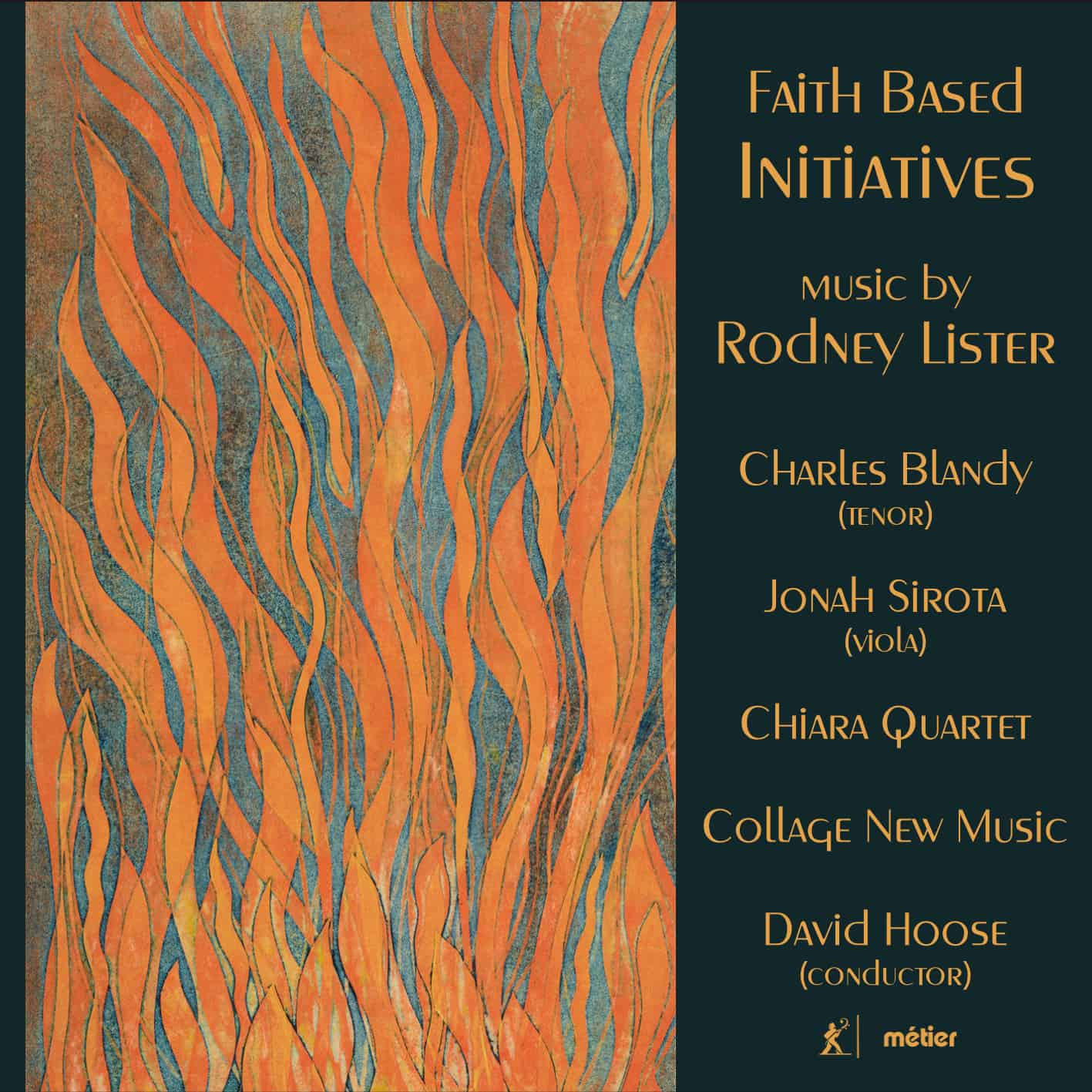Faith-Based Initiatives
Though the works on this album are varied in genre, from vocal to string quartet, they share a common theme, explicit in the song cycle Friendly Fire and implicit in the other works; that theme embodies grief, personal or for the plight of people blighted by war; hope in the backing of action by faith.
Rodney Lister is a composer based in New England. His biography is impressive and features commissions from the US Library of Congress and many leading ensembles, and a wealth of compositions, articles and other writings. He is currently teaching at Boston University and the New England Conservatory as well as tutoring duties at Harvard; he also works with the Greenwood Music Camp in Massachusetts.
This album offers a view of a composer whose output is both lyrical and abstract, with a poetic command of foreground and background, consonance and dissonance. Often, the core of the work is a borrowed or found fragment, in particular American hymn tunes. The melodies become locations of stability but subject to subtle and sometimes unsettling modifications.
NOTE: One of the poems included in Friendly Fire (‘For the Union Dead’ by Robert Lowell) contains a racial epithet considered unacceptable in day to day speech and writing today. It is retained because of its historical and social context in a poem which is strongly anti-racist and is a cry against the injustice meted out to African-American troops fighting for the Union in the American Civil War. The poem itself is regarded as a classic of modern literature, appreciated by commentators of all ethnicities.
Track Listing
- Faith-Based Initiative
- Complicated Grief - I. Fantasia
- Complicated Grief - II. Variance
- Complicated Grief - III. Quodlibet
- Friendly Fire - I. Ode to the Confederate Dead
- Friendly Fire - II. The Fury of Aerial Bombardment
- Friendly Fire - III. Women, Children, Babies, Cows, Cats
- Friendly Fire - IV. Losses
- Friendly Fire - V. The March into Virginia
- Friendly Fire - VI. The Death of the Ball Turret Gunner
- Friendly Fire - VII. Ashbah (The Ghosts of American Soldiers)
- Friendly Fire - VIII. A Box Comes Home
- Friendly Fire - IX. The Certainty
- Friendly Fire - X. For the Union Dead
Rodney Lister:
Reviews
“Serious and complex works… kudos to director David Hoose for holding the challenging instrumental parts in balance.
” —Barry Kilpatrick
“The works share a theme, that of grief, either personal or for the plight of people blighted by war. Unsettling and a little hard to listen to in places but it is those best of all things, interesting, and it’s got a moreish nature to it.
” —Jeremy Condliffe
“A most engaging and rewarding experience. This is highly accomplished, heartfelt, and expressive music that I believe will appeal to all who gravitate toward contemporary music with a decidedly lyrical orientation. Warmly recommended.
” —Ken Meltzer
“In all three of the works presented here, Lister proves he has a distinctive and secure compositional voice, one that is one well worth exploring by those who are seeking new and arresting music. This disc receives my firm recommendation.
” —David de Boor Canfield
“The UK-based record label Metier has a habit of picking winners, and the music of Rodney Lister is no exception. Lister’s range of emotion and sheer range of imagination is most impressive. This is a wonderful disc, faultlessly produced and recorded. Maybe it is Rodney Lister’s time for full recognition; on the basis of this evidence, I do hope so.
” —Colin Clarke
“The music is arresting and absorbing. This release deserves a recommendation to general listeners with adventurous ears, but in particular I think that anyone fascinated by Ives, American history, and our complex fate will find the music a rewarding experience.
” —Huntley Dent
“Faith-Based Initiative, which is largely tonal and somewhat reminiscent of Ives, is a single movement that effectively puts across a sense of darkness (if not despair), warmth, and a kind of underlying hope. The overall message of Friendly Fire is a thoroughly straightforward antiwar one and the instrumental ensemble accompanies the narrative with a strong emphasis on the percussive quality of all the instruments.
” —Mark J. Estren













